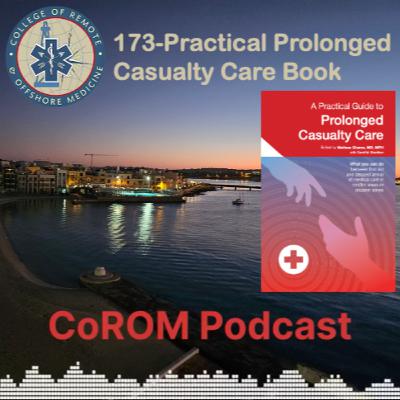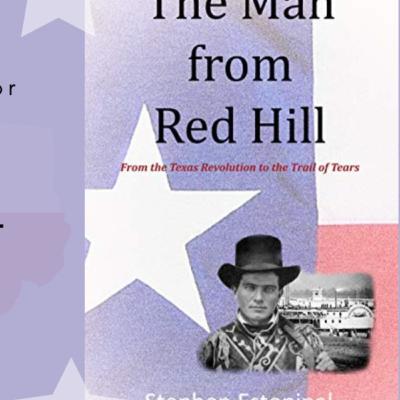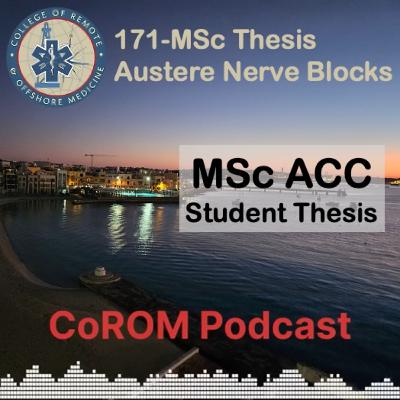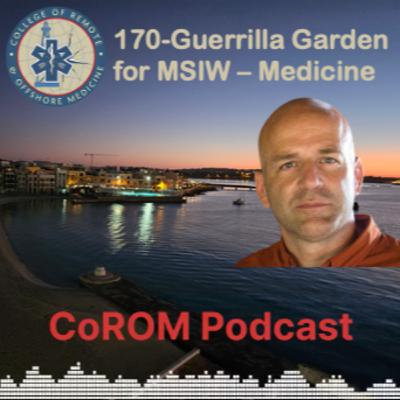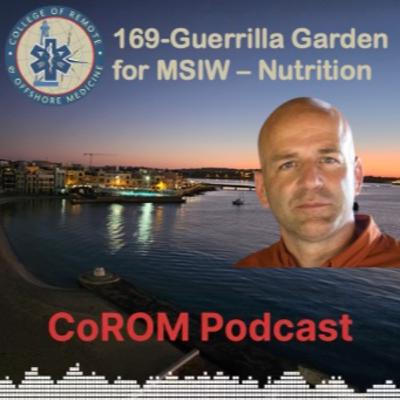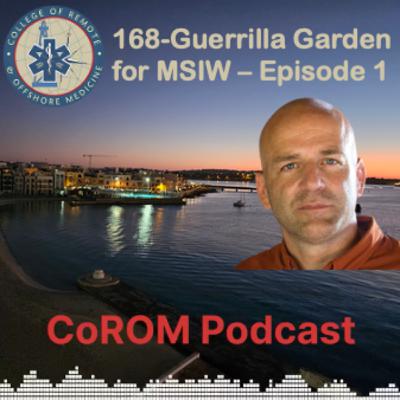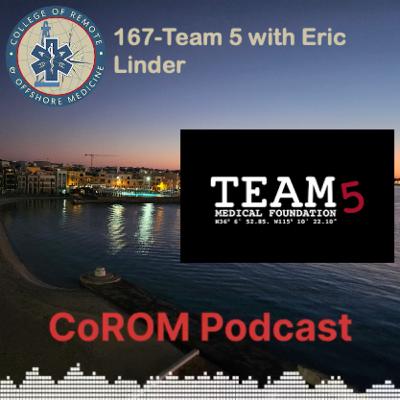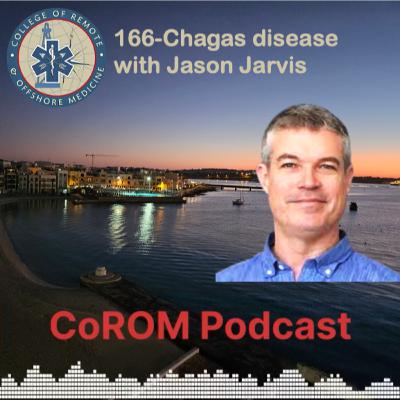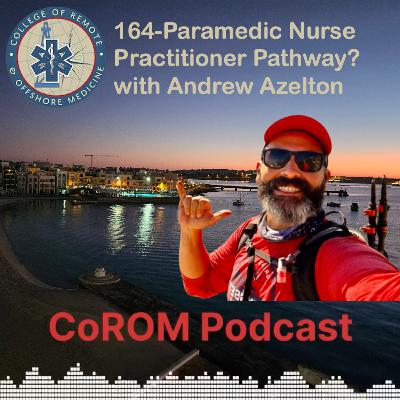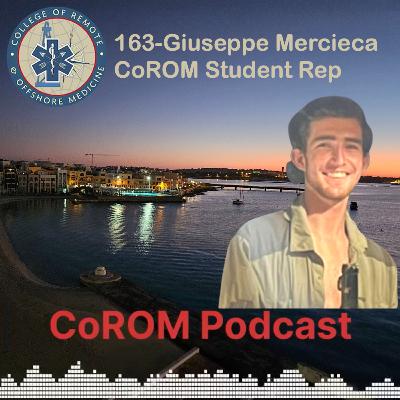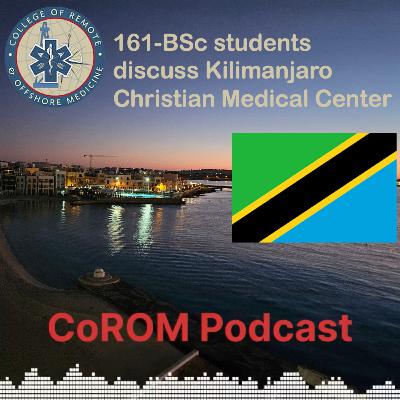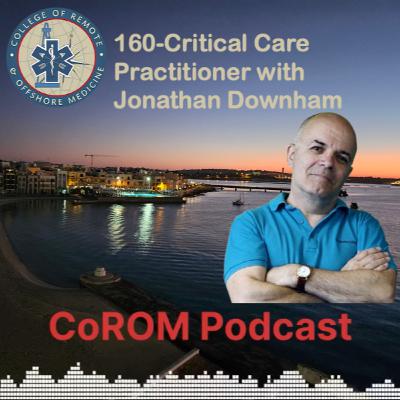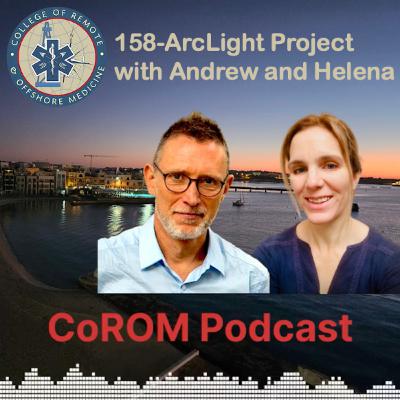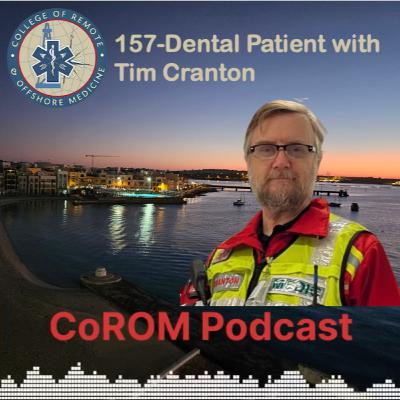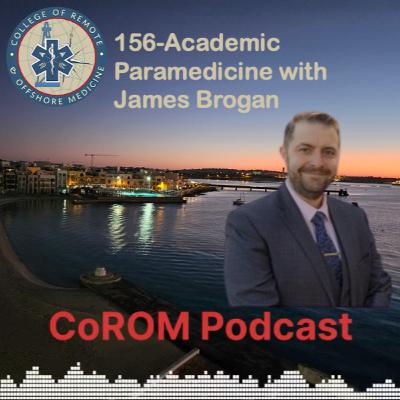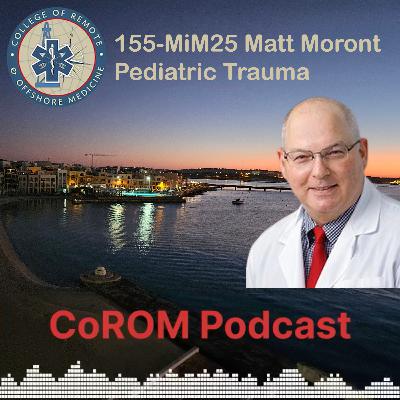Discover CoROM cast. Wilderness, Austere, Remote and Resource-limited Medicine.
CoROM cast. Wilderness, Austere, Remote and Resource-limited Medicine.

CoROM cast. Wilderness, Austere, Remote and Resource-limited Medicine.
Author: College of Remote and Offshore Medicine
Subscribed: 43Played: 575Subscribe
Share
© College of Remote and Offshore Medicine
Description
Hosted by Aebhric O'Kelly, a critical care paramedic and former Green Beret, CoROM Cast explores wilderness medicine, austere healthcare, tropical diseases, emergency medicine, and remote medical practice. Weekly discussions feature global experts on Prolonged Field Care, Austere Critical Care, disaster medicine, humanitarian response, military pre-hospital care, tropical medicine, expedition healthcare, medical innovation, and practical solutions for healthcare in resource-limited environments.
Published by CoROM Press
www.corom.edu.mt
Published by CoROM Press
www.corom.edu.mt
182 Episodes
Reverse
This week, Aebhric O’Kelly, Bill Vasios, and Rhod Jordan will host an open discussion on managing austere burn patients, covering airway management, fluid resuscitation, infection control, and pain management. The speakers emphasise the complexity of burn cases and the importance of accurate assessment and treatment protocols. They also highlight the need for effective communication and patient involvement in care, as well as the use of innovative techniques like topical morphine for pain management.TakeawaysBurns are incredibly complicated, but they're complex patients.Managing an individual patient's airway has to be factored in.You want to protect and secure the airway and avoid obstructions.The goal is to achieve maximal accuracy in fluid resuscitation.You can infuse that fluid rectally if you don't have IV fluids.Prophylactic antibiotics are not indicated in burn patients.Topical morphine works really, really well for pain management.Involving the patient in their care has a positive effect.Infection control is the means of preventing infection.Burn management is more art than science.Chapters00:00 Introduction to Burns Management03:08 Airway Management in Burn Patients05:52 Assessing Burn Size and Fluid Resuscitation09:00 Fluid Administration Techniques11:38 Oral vs IV Resuscitation14:53 Monitoring and Adjusting Treatment17:36 Dynamic Management of Burn Patients25:18 Vital Signs Monitoring in Critical Care28:01 Continuous Assessment and Patient Management32:07 Patient Involvement in Vital Signs Monitoring35:10 Urine Output and Fluid Resuscitation41:33 Infection Control in Burn Management48:20 Pain Management Strategies in Burns
This week, Aebhric is joined by Bill Vasios and Rhod Jordan, who recorded during the November 2025 CoROM Conversations. They discuss Practical Prolonged Casualty Care, a PDF from the US Military University, designed to equip lay responders with foundational skills for managing casualties over extended periods. The speakers underscore the critical role of clear communication, the value of structured training for non-medical personnel, and the practical relevance of the book’s guidance in real-world scenarios. They highlight the importance of engaging patients actively in their own care, as well as the inherent challenges associated with preparing laypersons for such responsibilities. Considerations of cultural context and the necessity of a collaborative, team-based approach to patient management are also brought to the forefront.TakeawaysThe book is designed for laypeople to understand basic medical care.Effective communication is crucial in patient care.Training non-medical personnel can enhance patient outcomes.Involving patients in their own care is beneficial.Cultural considerations play a significant role in patient care.The book provides practical techniques for prolonged casualty care.Regular assessment and monitoring are essential for patient safety.Lay responders should be trained to recognise nonverbal cues of discomfort.The importance of maintaining a regular routine for patients is emphasised.Cross-training team members can improve overall care.Chapters00:00 Introduction to Prolonged Casualty Care02:50 Deep Dive into the Book's Content06:04 Engaging Laypersons in Medical Care08:55 Communication and Patient Interaction11:37 Training Non-Medical Personnel14:49 Practical Applications and Techniques17:51 Understanding Patient Needs20:39 Challenges in Training and Implementation23:28 Cultural Considerations in Patient Care26:16 Conclusion and Future Directionshttps://www.usuhs.edu/sites/default/files/2025-09/Layperson%27s_Guide_to_Prolonged_Casualty_Care_090825_ACC.pdf
This week, Aebhric O’Kelly talks with Dr Chris Carter, a critical care nurse and academic, who shares his journey from military nursing to working in Zambia, where he has been instrumental in developing critical care nursing programs. He discusses the challenges and innovations in critical care nursing, particularly in resource-limited environments, and reflects on the impact of COVID-19 on the healthcare landscape. Dr Carter emphasises the importance of education, collaboration, and flexibility in nursing practice and offers advice for new professionals entering the field.TakeawaysDr Chris Carter transitioned from military nursing to academia.He is currently working in Zambia to enhance critical care education.COVID-19 highlighted the need for investment in critical care nursing.Collaboration with local stakeholders is crucial for program development.Innovations in critical care can improve patient outcomes.Education programs must be tailored to local needs and resources.There is a growing recognition of the importance of critical care nursing.Flexibility and adaptability are key in austere medical settings.Dr Carter advocates for updates to critical care nursing literature.New professionals should embrace every opportunity in their careers.Chapters00:00 Introduction to Dr. Chris Carter03:35 Journey to Zambia and Critical Care Education09:01 Developing Critical Care Nursing Programs12:34 The Impact of COVID-19 on Critical Care16:13 Innovations in Critical Care Nursing19:52 Future of Critical Care Nursing Education26:51 Advice for New Professionals in Austere Medicine
This week, Aebhric O’Kelly talks with Greydon Ratushny about his master’s thesis. He recently graduated from the MSc Austere Critical Care programme. They discuss the significant challenges faced in delivering quality healthcare in remote and rural areas of British Columbia. Greydon emphasises the critical role of pain management in improving patient experiences and outcomes, particularly in paramedic services. Ratushny highlights the immediate impact that effective pain management can have on patients and its importance in their overall healthcare journey.TakeawaysThere are significant challenges in delivering quality healthcare in rural areas.Pain management is a key focus for improving patient outcomes.An immediate impact on pain can enhance the patient experience.The quintuple aim concept is essential in healthcare delivery.Paramedics play a crucial role in managing pain effectively.Rural communities require tailored healthcare solutions.Understanding patient experiences is vital for healthcare improvement.Effective pain management can influence long-term patient recall.Healthcare delivery must adapt to the unique needs of remote areas.Research and innovation are needed to address rural healthcare challenges.Chapters00:01 – Introduction and guest welcome02:30 – ACC learning experience and placements06:15 – Motivation for choosing ACC09:50 – Curriculum gaps and collaboration13:55 – Programme redesign and electives15:40 – Thesis focus: austere nerve blocks20:10 – Scope of practice and POCUS24:30 – Pain management in prolonged transport29:40 – Rural healthcare equity challenges32:50 – Doctoral research ambitions35:40 – Advice to future candidates36:30 – Closing reflections
This week, Aebhric OKelly and Sam Coffman continue their discussion on the Guerrilla Medic and what to grow in their garden to supplement their ICU. Sam discusses the unique advantages of herbal remedies in treating viral infections. They discuss easy-to-find herbal medicine from your camp kitchen.TakeawaysHerbs can address specific health niches that pharmaceuticals cannot.Herbal formulas are effective for various viral infections.Herbs can help repair and restore tissue health.The mucosa and lymph movement are supported by herbal remedies.Herbs can slow down and stop virus shedding.Pharmaceuticals lack the holistic approach that herbs provide.Herbs can enhance the body's terrain for better health.Herbal remedies can be more effective in certain health conditions.The use of herbs can lead to better overall health outcomes.Understanding the unique benefits of herbs is crucial for health.Chapters00:00 Introduction to Medicinal Herbs10:46 Key Herbs for Upper Respiratory Health14:10 Herbs for Gut and Liver Support17:42 Common Kitchen Herbs to Support your ICU26:56 Honey as Medicine31:26 More Kitchen Herbs35:44 Improvised Medicine Workshop at SOMSA
This week, Aebhric and Sam continue their discussion of Medical Support for Irregular Warfare, specifically focusing on the use of the Guerrilla Garden. They discuss the unique advantages of herbal remedies compared to pharmaceuticals, particularly in treating viral infections. He highlights how herbs can effectively slow down virus shedding, repair tissue, and support overall health in ways that pharmaceuticals cannot.TakeawaysHerbs can address specific health niches that pharmaceuticals cannot.Herbal formulas are effective for various viral infections.Herbs can help repair and restore tissue health.Herbal remedies support the mucosal and lymphatic systems.Herbs can slow down and stop virus shedding.Pharmaceuticals lack the holistic approach that herbs provide.Herbs can enhance the body's terrain for better health.Herbal remedies can be more effective in certain health conditions.Using herbs can lead to better overall health outcomes.Understanding the unique benefits of herbs is crucial for health.Chapters00:00 Intro to Guerrilla Gardening and Nutrition01:48 Foraging and Wildcrafting for Food04:45 The Importance of Cooking Wild Foods07:33 Identifying Nutrient-Dense Plants10:06 Sprouting Seeds for Quick Nutrition13:06 Microgreens and Mushrooms as Food Sources16:17 Safe Mushroom Identification21:00 Planning for Sustainable Winter Nutrition24:27 Utilising Humanure for Soil Health26:04 Guerrilla Gardening Techniques33:37 Top Edible Plants for Guerrilla Medics
This week, Aebhric OKelly talks with Sam Coffman about the Guerrilla Medic and supplementing Medical Support for Irregular Warfare using locally procured plants. They discuss their training as Green Berets in MSIW and how the medic on the ground can learn and use plants to support the Guerrilla Clinic. This first episode lays the groundwork for this concept. They discuss the integration of herbal medicine with Western medical practices, emphasising the unique benefits of herbal formulas, particularly in treating viral infections and repairing tissue. The discussion highlights the potential of herbal medicine to address acute health issues where pharmaceuticals may fall short, and encourages practitioners to find specific niches where herbal remedies excel.Episode two drops next week and focuses on the use of plants to supplement the nutritional requirements for acute casualties and healthcare staff working in a hidden, remote clinic in semi-permissive environments. TakeawaysHerbs provide unique benefits that pharmaceuticals do not.Acute care is a significant area for herbal medicine.Finding niches for herbs can enhance treatment efficacy.Herbal medicine can complement Western medical practices.Viral infections can be treated with herbal treatments.Integrating herbal and Western medicine can support the Guerrilla clinic.Practitioners can easily master specific applications of herbs.Chapters00:00 Introduction to Herbal Medicine and Survival Gardening02:50 Sustainable Food Production in Crisis Situations05:38 Integrating Herbal Medicine into Resistance Healthcare12:16 Acute Care and Herbal Remedies14:28 Food Sources for Resistance Healthcare19:17 Foraging and Utilising Local Plants22:26 The Use of Alder and Medicinal Herbs24:45 Lessons from Guerrilla Medicine in WWII26:59 Building a Decentralised Medical System30:38 Wildcrafting: Harnessing Nature’s Pharmacy35:12 Creating a Learning Pathway for Remote Medics42:19 Integrating Herbal Medicine into Resistance Healthcare
This week, Aebhric OKelly talks with Eric Linder, who shares the inspiring journey of Team 5, an organisation dedicated to providing remote medical care in underserved communities. Starting as a small group of friends, Team 5 has evolved over 15 years, focusing on humanitarian work without political or religious affiliations. Eric discusses the importance of education and training in remote medicine, emphasising the need for adaptability and cultural understanding. He also offers valuable advice for aspiring remote medics, highlighting the significance of hands-on experience and proper education in making a meaningful impact in global health.TakeawaysTeam 5 started as a small group of friends wanting to help others.The mission evolved from Belize to Guatemala due to logistical challenges.Team 5 focuses on providing medical care without political or religious affiliations.The organisation has grown, but it aims to keep missions small and effective.Eric Linder integrates educational programs with practical missions for students.Remote medicine requires adaptability and understanding of local cultures.Training in remote medicine is essential for effective humanitarian work.Volunteering in underserved areas can provide valuable experience.Education in public health is crucial for addressing global health issues.Team 5 emphasises the importance of being prepared for challenging environments.Chapters00:00 The Birth of Team 513:16 Expanding Horizons in Remote Medicine26:53 Education and Training in Remote Medicine30:55 Advice for Aspiring Remote Medics
This week, Aebhric talks with Jason Jarvis, a former Special Forces medic and current PhD candidate, and discusses Chagas disease, a tropical disease transmitted by the kissing bug. He explains the life cycle of the bug, the transmission of the disease, its clinical presentation, and the challenges in diagnosis and treatment. The conversation emphasises the importance of awareness and preventive measures, especially as Chagas disease is spreading to new regions, including parts of the United States. The discussion concludes with key take-home messages for healthcare providers and the need for ongoing education in tropical medicine.TakeawaysChagas disease is transmitted by the kissing bug, primarily in Central and South America.The life cycle of the kissing bug involves several stages, including the transmission of the parasite through its faeces.Clinical diagnosis is essential, especially in endemic areas where the disease is prevalent.The acute phase of Chagas disease is easier to treat than the chronic phase, which can lead to severe complications.Preventive measures include avoiding exposure to kissing bugs and ensuring blood products are screened for the disease.Chagas disease can also be transmitted through blood transfusions and organ transplants.Healthcare providers should be aware of the symptoms and risk factors associated with Chagas disease.The disease is now spreading to parts of the continental US, raising public health concerns.Ongoing education and awareness of tropical diseases are crucial for healthcare providers.The conversation highlights the importance of understanding the global health implications of diseases like Chagas. Chapters00:00 Introduction to Chagas Disease and Its Relevance02:36 Life Cycle of the Kissing Bug and Transmission of Chagas Disease04:58 Understanding the Pathophysiology of Chagas Disease07:31 Clinical Presentation and Diagnosis of Chagas Disease10:18 Chronic Phase and Long-term Effects of Chagas Disease12:41 Treatment Options and Challenges in Managing Chagas Disease14:51 Preventive Measures and Risk Factors for Chagas Disease17:39 Chagas Disease in the Context of Global Health19:42 Take-Home Messages for Healthcare Providers22:20 Future Considerations and Closing Thoughts
This week, Aebhric talks with students from the University of Pavia in Italy who were attending the Austere and Prehospital Ultrasound course. They discuss innovative teaching methods of ultrasound in medical education, particularly focusing on peer-to-peer learning and the integration of ultrasound training with anatomy education. The students share their experiences with the CoROM ultrasound course, emphasising the practical approach that enhances their understanding of anatomy and clinical skills. They also discuss the challenges of implementing ultrasound training within the medical curriculum and the importance of hands-on experience in mastering ultrasound skills. The conversation highlights the need for supportive faculty and the potential for peer-to-peer teaching to improve learning outcomes in medical education.TakeawaysThe CoROM ultrasound course emphasises practical learning over theoretical knowledge.Peer-to-peer teaching enhances understanding and retention of ultrasound skills.Integrating ultrasound training with anatomy education provides a dynamic learning experience.Students benefit from hands-on experience in real clinical settings.Ultrasound is a skill-based tool that requires practice to master.The importance of having supportive faculty in implementing new teaching methods.Innovative teaching approaches can make learning more engaging and effective.Students are motivated to continue learning and teaching ultrasound skills.There is a need for a standardised curriculum for ultrasound training in medical education.Continuous assessment and practice are key to becoming proficient in ultrasound. Chapters00:00 Introduction to the Quorum Podcast and Course Overview01:04 Experiences with the Quorum Ultrasound Teaching Method03:26 Integrating Ultrasound with Anatomy Education06:29 Peer-to-Peer Teaching in Ultrasound Training08:53 The Role of Ultrasound in Clinical Education11:43 Challenges and Support in Implementing Ultrasound Training15:09 Innovative Teaching Approaches in Ultrasound Education17:57 Understanding Ultrasound Through Hands-On Experience19:53 Future Plans for Ultrasound Curriculum Integration23:43 The Importance of Peer-to-Peer Learning in Medicine26:51 Advice for Beginners in Ultrasound Training
This week, Aebhric talks with Andrew Azelton, a CoROM MSc student, discussing his journey through the EMS field and the challenges faced in pursuing advanced practice as a paramedic. He highlights the lack of master's programs in the U.S. that focus on clinical experience, contrasting it with the more developed systems in Europe. The discussion explores state regulations, the variability of care across different regions, and potential pathways for paramedics to advance their roles within the healthcare system.They explore the concept of an advanced practice paramedic, comparing EMS systems in the U.S. and Europe, discussing funding challenges, and the potential for creating new pathways for paramedics. It emphasises the need for advanced education and training, as well as the importance of funding in implementing changes in the EMS system. The discussion also touches on the future of paramedic education and offers advice for new medics entering austere medicine.TakeawaysAndrew Aselton is pursuing a master's program in EMS.The U.S. lacks master's programs focused on clinical experience for paramedics.The EMS system in the U.S. is fractured and varies by state.In Europe, paramedics have their own licenses and greater autonomy.State regulations have a significant impact on the practice of paramedics in the U.S.Advanced practice paramedics are emerging in some states, like Kentucky.There is a need for a structured pathway for advanced practice paramedics in the U.S.The conversation highlights the differences in EMS practices between the U.S. and Europe.Waving a magic wand could lead to significant changes in paramedic education.The discussion raises questions about the future of paramedics in advanced roles.An advanced practice paramedic should have field experience and a graduate degree.Hands-on learning and clinical attachments are crucial for paramedic education.The EMS system in the U.S. varies significantly by state and funding.Funding challenges hinder the implementation of advanced practice paramedics in the U.S.EMS is often not considered an essential service, which can impact funding and resources.Data shows that treatment release can save money and reduce hospital admissions.A national support system is needed for advanced practice paramedics.Creating a nurse practitioner pathway for paramedics could be beneficial.Funding disparities exist between tax-based and for-profit EMS systems.New medical professionals should seek appropriate training and be prepared for the challenges of working in austere environments.Chapters00:00 Introduction to Andrew Aselton and His Journey02:37 Challenges and Growth in the Master's Program05:10 The State of EMS Education in the U.S.07:47 Advanced Practice Paramedics: A Path Forward10:41 The Future of EMS and Advanced Practice Opportunities12:00 Designing the Advanced Practice Paramedic14:52 Comparing EMS Systems: U.S. vs Europe18:00 Funding Challenges in EMS21:50 The Role of Advanced Practice Providers24:08 Creating a New Pathway for Paramedics29:59 The Future of Paramedic Education32:59 Advice for New Medics in Austere Medicine
This week, Aebhric OKelly speaks with Giuseppe Mercieca, the CoROM student representative. They discuss his role as a student advocate, the importance of improvisation in medical training, and the college's future aspirations. The conversation also touches on student feedback, career pathways for paramedics, and advice for new students considering a paramedic program.TakeawaysGiuseppe is a bachelor's student preparing for his clinical placement.He aims to improve communication and support for students.High-fidelity scenarios enhance learning experiences.Improvised medical techniques are crucial in austere environments.Student feedback is essential for program development.Career opportunities exist in remote and offshore medical positions.Networking and volunteering are key to finding jobs.The college is expanding programs based on student demand.CPD courses can serve as an introduction to the program.Collaboration with other medical professionals is vital for progress.Chapters00:00 Introduction to Eye Care Course in Malta02:29 Role of Student Representative05:09 Improvised Medical Techniques07:20 Future Aspirations for the College09:27 Student Feedback and Engagement11:55 Career Pathways for Paramedics14:24 Advice for New Paramedic Students
In this episode, host Aebhric O’Kelly kicks off the new academic year and reflects on the growth of the College of Remote and Offshore Medicine (CoROM), which will celebrate its 10-year anniversary next year. What began in 2016 with just 16 students has grown into an international institution with over 100 students across four degree programmes.This episode features conversations with the leaders of CoROM’s three postgraduate programmes:Dr Ella Corrick – Director of the Doctorate in Health Sciences (DHS), who discusses the growth of the doctoral cohort, the possibility of transitioning to a PhD programme, and the vital role of building a strong online academic community.Dr Csaba Dioszeghy – Programme Manager of the MSc in Austere Critical Care (ACC), who shares upcoming updates, including flexible online pathways, new elective modules in ultrasound and paediatric critical care, and stronger international clinical placement partnerships.Dr Nick Zuber – Programme Director of the Masters in Global Health (MGH), who explains the difference between global and public health, the diverse career opportunities for graduates, and how this degree prepares clinicians for leadership roles in international healthcare systems and disaster relief.
This week, Aebhric OKelly talks with Pierto Batistoni, Grant Hollyoake, and Finn McNamara, who are currently going through the BSc Remote Paramedic Practice programme. They explore the experiences of paramedic students during their clinical placements in Tanzania, focusing on their integration with local medical staff, the challenges they face in emergency medicine, and the unique medical cases they encounter, particularly related to altitude sickness. The students share insights on their learning experiences, the skills they are developing, and the cultural aspects of living and working in Tanzania. They also discuss the importance of building relationships with local healthcare professionals and the impact of their experiences on their future careers in medicine.TakeawaysThe integration with local staff enhances learning and trust.Emergency medicine in Tanzania presents unique challenges.Improvised medical solutions are often necessary in resource-limited settings.Altitude sickness is a common issue for climbers on Kilimanjaro.Building relationships with local healthcare professionals is crucial.Clinical placements provide hands-on experience in real-life scenarios.Students experience a wide range of medical cases during their placements.Cultural experiences enrich the overall learning process.Living conditions can vary, impacting student experiences.Advice for future students includes joining local networks for support.Chapters00:00 Introduction to Clinical Experiences in Tanzania01:59 Diverse Backgrounds and Initial Challenges04:16 Integration with Medical Staff06:12 Experiences in the Emergency Department07:46 Improvised Medical Practices09:54 Common Injuries and Case Studies12:08 Altitude-Related Illnesses14:51 Clinical Skills and Learning Opportunities20:21 Living Conditions and Accommodation24:34 Leisure Activities and Cultural Experiences27:17 Advice for Future Students
This week, Aebhric O’Kelly talks with Jonathan Downham, an advanced critical care practitioner, who shares his journey and insights into the evolving role of advanced practitioners in healthcare. He discusses the training pathways, responsibilities, and the importance of collaboration with junior doctors. Jonathan emphasises the need for continuous learning, research opportunities, and the future of advanced practice in critical care. He also highlights his innovative approach to training through e-learning and podcasts, aiming to enhance the skills of healthcare professionals.TakeawaysJonathan Downham is an advanced critical care practitioner with extensive experience in nursing.The role of advanced critical care practitioners (ACCPs) is to provide consistency in critical care units.ACCPs are trained to perform many tasks traditionally done by junior doctors, enhancing patient care.Training for ACCPs includes a postgraduate diploma and a master's degree, focusing on clinical skills and research.ACCPs have their own license to practice and can prescribe medications independently.The role of ACCPs is evolving, with opportunities in research and education.There is a growing recognition of the value of ACCPs in the healthcare system.The future of ACCPs may involve more independence and leadership roles in healthcare.Jonathan has created an e-learning platform to enhance training for critical care practitioners.Continuous learning and curiosity are essential for success in healthcare.Chapters00:00 Introduction to Advanced Critical Care Practice04:34 The Role of Advanced Critical Care Practitioners09:09 Training Pathways and Qualifications14:06 Independence and Responsibilities of ACCPs19:44 Research and Publication in Advanced Practice26:40 Future of Advanced Critical Care Practitioners29:21 Creating Educational Resources for Critical Care33:22 Advice for New Practitioners
This week, Aebhric talks with Mark Lopshire, who shares his extensive experience in humanitarian medical support, particularly in crisis zones. He discusses the challenges faced in providing medical care in conflict areas, the innovative solutions developed in austere environments, and the importance of training in wilderness medicine. Mark emphasises the need for flexibility and cultural understanding when working in diverse settings, and he highlights the role of organisations like the Wilderness Medical Society in advancing the field of wilderness medicine.TakeawaysMark Lopshire has a diverse background in the military and medical fields.He is involved with an NGO that provides medical support in crisis situations.The organisation deploys quickly to areas affected by disasters or conflict.Medical care in austere environments requires improvisation and innovation.Local economies are supported by purchasing supplies locally when possible.Flexibility and patience are crucial for medical professionals in crisis zones.Wilderness medicine training is essential for effective practice in remote areas.Cultural understanding is vital when working with diverse populations.The Wilderness Medical Society offers valuable resources for practitioners.Mark encourages new practitioners to embrace challenges and learn from experiences. Chapters00:00 Introduction to Mark Lopshire and His Background03:09 Wilderness Medical Society's Role in Crisis Response05:50 Experiences in Ukraine and International Medical Support08:59 Challenges of Providing Medical Care in Conflict Zones11:40 Innovative Solutions in Austere Environments14:09 Haiti: Lessons from a Major Earthquake Response16:54 Getting Involved in Humanitarian Medical Efforts19:50 The Wilderness Medical Society and Its Importance22:48 Fellowship in Wilderness Medicine: Benefits and Opportunities25:42 Future Aspirations and Advice for New Medical Professionals 32:36 Advice for newly qualified
This week, Aebhric O’Kelly talks with Dr. Andrew Blaikie and Dr Helena Feasey, from St Andrews University in Scotland. They discuss the ArcLight device, a revolutionary tool designed for eye and ear examinations in low-resource settings. They share insights into the device's features, its development journey, and its potential impact on global health. The discussion highlights the importance of training healthcare workers, the device's telemedicine capabilities, and ongoing research aimed at reducing preventable blindness and deafness in communities worldwide.TakeawaysThe ArcLight device is a portable eye and ear examination tool.It uses solar power and is designed for low-resource settings.The device has been in development for over a decade.It allows healthcare workers to perform comprehensive examinations.The device is robust and can withstand harsh conditions.Telemedicine capabilities enhance its utility in remote areas.Research shows it is clinically equivalent to traditional devices.Training programs are essential for effective implementation.Future research aims to reduce preventable blindness and deafness.The ArcLight project collaborates with various NGOs globally.Chapters00:00 Introduction to ArcLight and Its Creators03:32 The ArcLight Device: Features and Benefits08:49 Clinical Applications and Telemedicine Potential14:06 Research and Development of ArcLight18:58 Future Directions and Community Impact
This week, Aebhric O’Kelly talks with Tim Cranton, who shares his experiences as an offshore medic, detailing a challenging patient case involving dental pain and the complexities of providing care in a remote setting. He discusses the importance of proper patient management, the challenges of medication availability, and the need for improved training in offshore medical practice. Tim emphasises the significance of networking and continuous education for aspiring offshore medics, as well as the potential for developing specialised courses in dental care for medics working in remote environments.TakeawaysTim Cranton is an experienced offshore medic with a background in global health.Managing patients in remote settings requires careful observation and assessment.Antibiotic stewardship is crucial in offshore medical practice.Pain management is a key aspect of treating dental emergencies.Communication with topside medical services is essential for patient care.Remote healthcare often involves waiting for transport due to weather conditions.Continuous education and training are vital for offshore medics.Networking is important for career advancement in offshore medicine.There is a need for more specialised training in dental care for medics.Tim advocates for the development of a dedicated offshore medics course. Chapters00:00 Introduction to Offshore Medicine26:37 Challenges in Remote Healthcare35:19 Future of Offshore Medic Training
This week, Aebhric O’Kelly talks with James Brogan, a UK paramedic and lecturer at Robert Gordon University, who discusses the unique challenges and opportunities in paramedicine, particularly in rural and remote areas of Scotland. He emphasises the importance of practice-based learning, the role of paramedics in public health, and the evolution of paramedic education towards a more academic and professionalised approach. Brogan also highlights the significance of decision-making skills in austere environments and offers advice for new paramedics entering the field.TakeawaysJames Brogan is a principal lecturer of paramedicine at Robert Gordon University.The university focuses on rural and remote paramedicine education.Practice-based learning is crucial for paramedic training.Paramedics play a significant role in public health initiatives.Austere medicine requires unique skills and decision-making abilities.The evolution of paramedic education has led to a more academic approach.Professionalisation of paramedics is essential for adapting to healthcare needs.Future paramedics will need to be versatile in various environments.Decision-making is more critical than just technical skills.New paramedics should focus on evidence-based practice and holistic care.Chapters00:00 Introduction to Paramedicine in Scotland02:22 The Unique Challenges of Rural and Remote Paramedicine04:56 Practice-Based Learning and Its Importance07:54 The Role of Paramedics in Public Health10:13 Austere Medicine and Prolonged Field Care13:05 The Evolution of Paramedic Education15:32 The Professionalisation of Paramedicine18:17 The Future of Paramedicine20:55 Advice for New Paramedics23:29 Conclusion and Reflections on Paramedicine
This week, we have another presentation from the Medicine in the Mediterranean conference from January 2025. Dr Matt Moront is a pediatric surgeon who provides an in-depth exploration of pediatric trauma care, emphasising the unique anatomical and physiological differences in children compared to adults. The speaker discusses common pediatric injuries, particularly in urban settings, and highlights the importance of airway management, weight estimation for medication dosing, and recognising signs of shock. Techniques for intubation and intravenous access in children are also covered, along with concerns regarding radiation exposure in pediatric imaging. The session concludes with key takeaways for healthcare providers working with pediatric patients.TakeawaysAirway management is critical in pediatric patients.Children are not just smaller adults; they have unique anatomical differences.Most pediatric trauma cases involve motor vehicle accidents and falls.Weight estimation is crucial for medication dosing in children.Children can maintain blood pressure until a significant volume of blood is lost.Intubation in children requires specific techniques and considerations.Radiation exposure in children should be minimised due to their sensitivity.Pediatric patients often present differently than adults in shock situations.Using the right size equipment is essential for pediatric care.Clinical indicators of shock in children are often visual rather than reliant on technology.Chapters00:00 Introduction to Pediatric Trauma Care02:40 Understanding Pediatric Injuries in Urban Settings05:23 Anatomical and Physiological Differences in Children08:34 Airway Management in Pediatric Patients11:21 Weight Estimation and Medication Dosing for Children14:12 Assessing Pediatric Vital Signs and Shock Indicators16:54 Intubation Techniques and Considerations for Children20:08 Practical Tips for Pediatric Emergency Care25:55 Intubation Techniques for Pediatric Patients29:00 Medications in Pediatric Intubation33:57 IV Access in Children40:00 Radiation Considerations in Pediatric Care



